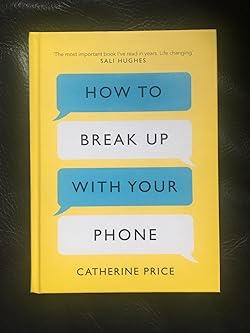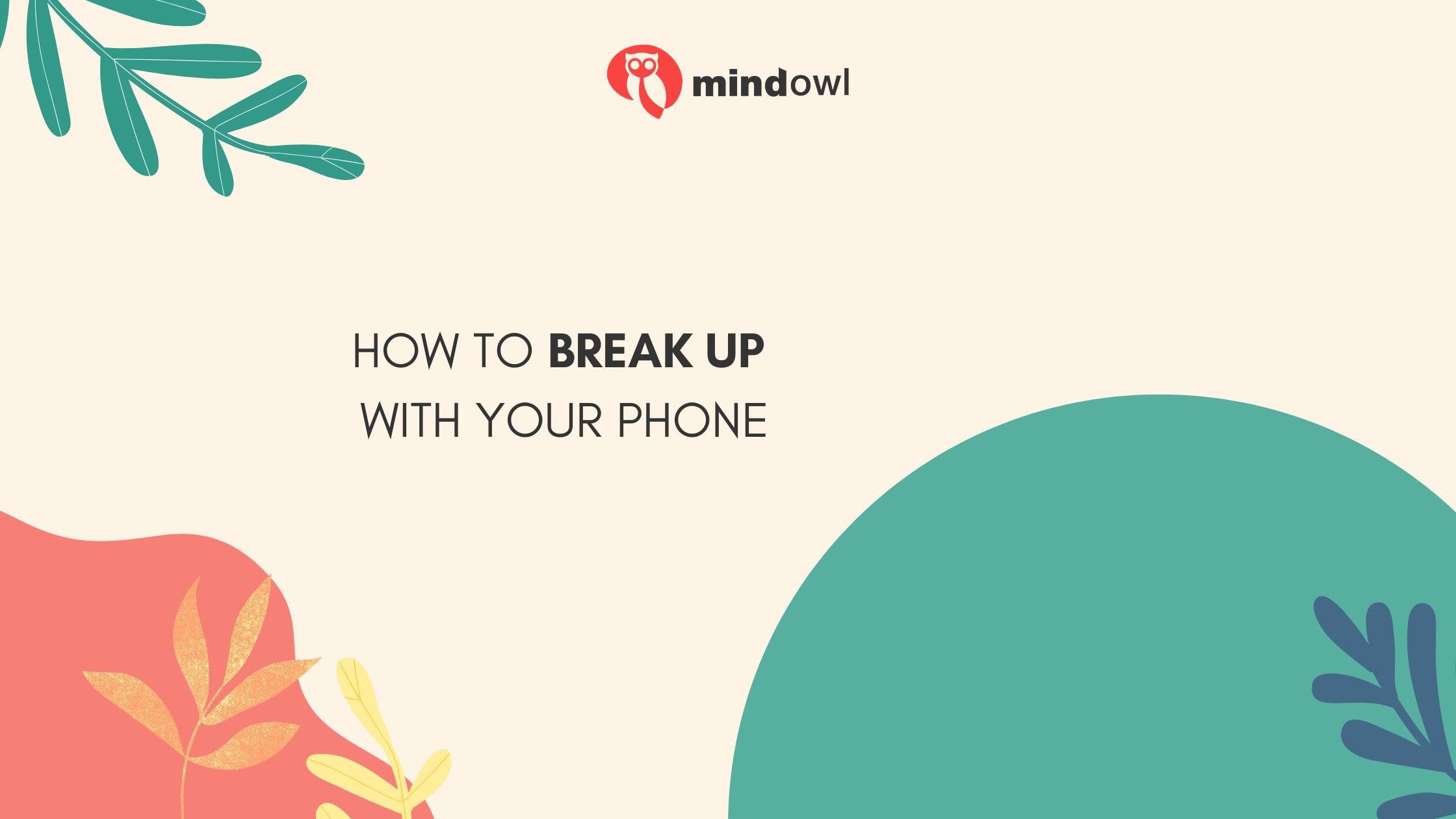Are you finding yourself constantly glued to your phone, scrolling through social media without a real purpose? If the answer is yes, you’re not alone. Many of us feel trapped in the loop of endless notifications and digital distractions.
But there’s good news – breaking up with your phone isn’t as hard as it seems. One key fact that might inspire you is Catherine Price’s book “How to Break Up with Your Phone”. It offers a 30-day plan that has already guided many towards regaining control over their device rather than letting it control them.
This blog post will explore ways to establish a healthier relationship with your smartphone. From understanding why this breakup is necessary to implement practical strategies for reducing screen time, we’ve got you covered.
By following our simple advice, inspired by experts like Price, you can reclaim precious moments of your life and find joy beyond the screen.
Key Takeaways
- Breaking up with your phone means creating a healthier relationship where you control it, not the other way around.
- Overusing your phone can cause both physical issues like neck pain and psychological problems such as anxiety.
- Setting ‘phone-free‘ zones in places like bedrooms helps focus on personal connections.
- Using apps to monitor and limit phone use can reduce screen time effectively.
- Practising mindfulness improves digital wellness by making you aware of your habits, leading to a balanced use of technology.

Understanding the Need to Break Up With Your Phone
Phones are like the Marie Kondo of our brains, but sometimes they fill it with clutter instead of joy. They keep us connected, entertain us, and even help manage our lives. Yet, there’s a thin line between use and overuse.
Realising the need to break up with your phone is about acknowledging this delicate balance. It’s not about throwing your device away or declaring technology as bad. Instead, it’s about creating a healthier relationship where you control your phone usage rather than letting it control you.
Acknowledging the power that phones have in shaping our daily habits and interactions points to an urgent need for change. We often reach for them first thing in the morning and spend minutes later wondering where the time has gone.
This habit influences how we interact with the world around us and can shift our priorities from real-life relationships to those happening on screens. Breaking up with your phone enables you to take back control of your life, ensuring that you’re using technology as a tool to enhance, not detract from, your quality of life.
The Implications of Overdependence on Mobile Devices
Overdependence on mobile devices can lead to various negative effects. It may result in physical issues like eye strain, neck pain, and poor posture. Moreover, excessive phone use can cause psychological problems such as anxiety, depression, and reduced attention span.
Physical Implications
Staring at screens for long hours can cause eye strain and headaches. Many people feel the pinch in their neck and back from leaning over their phones. This posture isn’t good for our bodies.
It leads to pain and discomfort, making it hard to focus on other activities.
Using your phone too much can also make you less active. You might find yourself sitting or lying down while scrolling through social media or playing games instead of moving around.
This lack of activity can hurt your health over time, leading to problems like weight gain and weaker muscles. Plus, poor sleep from late-night phone use leaves you tired the next day, struggling to stay awake and energetic.
Psychological Implications
Spending too much time on your phone leads to sleep problems, stress, and feeling sad. These issues affect how we think and feel about ourselves and the world around us. Our phones keep us from enjoying the moment because they’re so distracting.
Having a phone addiction can make it hard for people to have real talks or connect with others without screens. This might make someone feel lonely or left out even when they’re around friends or family.

Strategies for Breaking Up With Your Phone
Creating ‘Phone-Free’ Zones
Establishing phone-free zones in your home is a key step in breaking up with your phone. Choose specific areas where phones are not allowed, like the bedroom or dining table. This helps everyone focus on personal connections and enjoy meals without distractions.
It’s also good for getting better sleep without the blue light from screens keeping you awake.
Making these zones encourages family members to engage more with each other and less with their devices. Start small by picking one room and gradually expand the idea as everyone gets used to it.
Having clear spots where technology takes a backseat allows for more quality time spent reading, talking, or simply being together without any screens involved.
Utilising Technology to Control Phone Usage
Setting boundaries with your phone can seem tricky, but technology itself offers a helping hand. Various apps enable you to monitor how much time you spend on your phone each day. You can set limits for specific apps or activities that tend to eat up your time.
For example, if scrolling through social media is your weak spot, these tools will remind you when it’s time to take a break.
Switching off notifications from apps that aren’t important can also reduce the urge to constantly check your phone. This action helps keep your focus on real-life interactions rather than being drawn into the digital world every few minutes.
Making use of ‘Do Not Disturb’ features during family time or personal relaxation moments ensures that you’re not interrupted, giving you control over when and how you engage with your device.
Practising Mindfulness and Self-awareness
Practising mindfulness and self-awareness helps you notice your phone habits. This awareness can shift how you use your phone, moving from harmful patterns to healthier ones. Mindfulness brings focus to the present moment, making you think before picking up your phone “just to check.” It’s about making intentional choices rather than scrolling aimlessly.
Mindfulness techniques improve digital wellness, reducing smartphone addiction. They encourage paying attention to when and why you reach for your phone. Is it boredom or a habit? These methods help form a better relationship with technology—enabling a balance between online and real-world interactions.
4-week plan to break up with your phone
Here is a proposed 4-week plan to break up with your phone and take back your life, inspired by the book “How to Break Up With Your Phone” by Catherine Price:
Week 1: Technology Triage
The first week focuses on assessing your current relationship with your phone and starting to cut back on mindless usage. The steps include:
- Download a tracking app to see how much time you spend on your phone
- Reflect on what you get out of your phone usage – is it a healthy relationship?
- Pay attention to when, how, and why you use your phone
- Delete social media apps from your phone
- Find activities to replace phone time
- Do something physical and enjoyable
Week 2: Changing Your Habits
In the second week, you start building new habits to reduce excessive phone use:
- Turn off all notifications except calls and messages
- Delete unnecessary apps
- Change where you charge your phone at night
- Set routines to replace phone habits
- Download app blockers
- Set no-phone zones
- Stop “phubbing” (snubbing people for your phone)
Week 3: Reclaiming Your Brain
The third week aims to retrain your brain’s ability to focus and be present:
- Practice pausing before reaching for your phone
- Do attention exercises to build your focus
- Try meditation
- Prepare for a 24-hour trial separation from your phone
- Go 24 hours without your phone
Week 4: Your New Relationship
In the final week, you solidify new boundaries with your phone:
- Reflect on your 24-hour separation
- Schedule phone-free times and events
- Manage cravings to check your phone
- Declutter the rest of your digital life
- Question whether checking your phone is worthwhile
- Take regular digital sabbaths
- Make a plan for your ideal phone habits
- Schedule check-ins to maintain your progress
By following this 4-week plan, you can reset your relationship with your phone from being an unhealthy addiction to using it as a helpful tool on your own terms.
Conclusion
Ready to break free from your phone and reclaim your life? “How To Break Up With Your Phone” offers practical strategies for a healthier relationship with technology. Follow the 30-day plan to take back control, create phone-free zones, and be more mindful of your usage.
It’s time to embrace a balanced digital lifestyle and enjoy the real world without constant screen distractions.
FAQs
1. What is “How To Break Up With Your Phone” about?
This book, penned by science journalist Catherine Price, acts as a life-changing guide. It offers a 30-day plan to help you spend less time glued to your phone and more on what truly matters in life.
2. Who should read this book?
Anyone feeling overwhelmed by the constant pull of their device! Whether you’re a self-identified tech addict like Catherine Price or just someone looking to set boundaries with your digital companion, this little book has practical tips for everyone.
3. Does the book offer practical advice on reducing phone usage?
From customising your settings to keeping your phone in another room, Price suggests hands-on strategies — even wrapping a rubber band around your phone — to help break the addiction without giving it up completely.
4. How does the book suggest I start my day differently?
Instead of reaching for your phone first thing in the morning, Catherine recommends turning off notifications and placing engaging lock screen images that prompt you to take a deep breath and embrace the day ahead without distractions.
5. Can removing apps really help me use my phone less?
Yes, indeed! By deleting social media apps from your device or leaving your phone away while at work or during meals, you’ll find yourself spending significantly less time on it. The idea is to prioritise real-life relationships over those confined within screens.
6. What’s unique about Catherine Price’s approach in this book?
Catherine combines her expertise as a journalist and author with her personal experiences as a tech addict who decided enough was enough. Her method isn’t just theoretical; it’s filled with actionable steps based on both research and real-life trials.
MindOwl Founder – My own struggles in life have led me to this path of understanding the human condition. I graduated with a bachelor’s degree in philosophy before completing a master’s degree in psychology at Regent’s University London. I then completed a postgraduate diploma in philosophical counselling before being trained in ACT (Acceptance and commitment therapy).
I’ve spent the last eight years studying the encounter of meditative practices with modern psychology.

